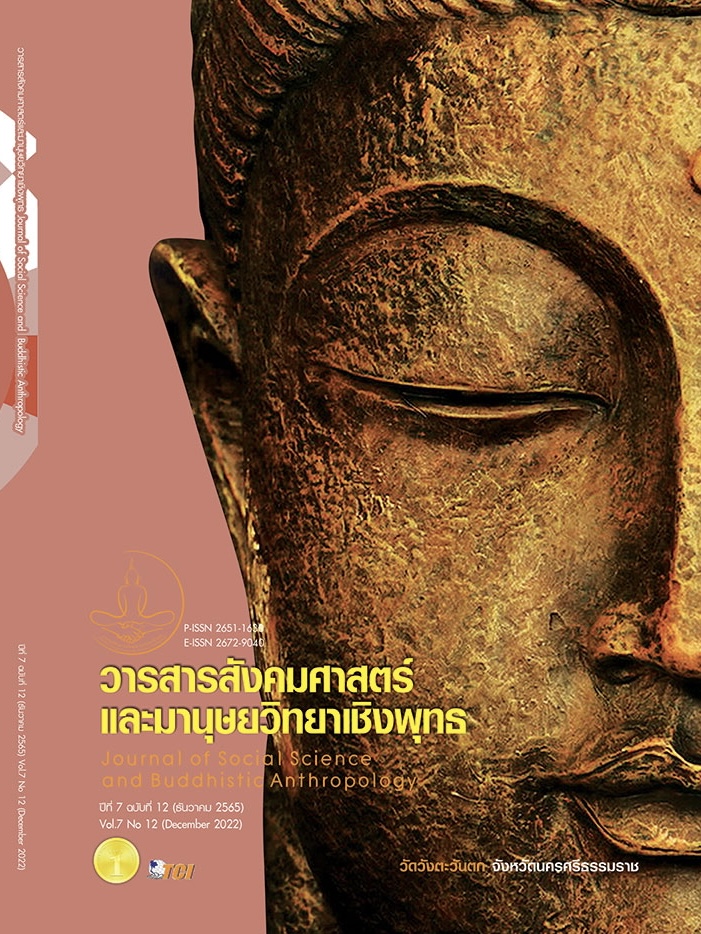GOVERNMENT APPLICATIONS ACCEPTANCE OF CITIZEN
Keywords:
Communication, Application acceptance Process, Government’s ApplicationAbstract
The objective of this research was to study the following: 1) Demographic factors that influenced the process of government application acceptance in Thai citizens, 2) Relationship factors related to citizens’ acceptance of the government application, and 3) Ways to improve the process of government application acceptance. Mixed-method research, Qualitative and Quantitative, were conducted in parallel. For the Quantitative Research, analytical statistics used a nationwide online Accidental Sampling method to obtain 400 samples. For the Qualitative Research, analyze data by generating conclusions from the statistical package of 3 groups, a total of 16 in-depth interview samples. (1) 10 everyday citizens explicitly chosen from the Quantitative Research participants, (2) 3 experts who work in the application development field, (3) 3 policymakers who are decision-makers in the Ministry of Digital Economy and Society. The structured in-depth interview format analysis using the conceptual framework, combined with related theories and research, indicated that: 1) Users’ demographic differences did not affect the application acceptance process. 2) Factors influencing the acceptance process of government applications were positively correlated, which shows the excellent tendencies of the people who believe in government applications. 3) User’s process in the government application acceptance considering. 1) the application should base on public benefit, be user-friendly, with high cyber security, respectively 2) before the application development process, communication between government agencies or an appointed central authority is essential for coordination to reduce redundancy in the application development process. 3) The government should develop One Single Application that combines government services in one platform
References
กนกวรรณ ครินชัย. (2554). ปัจจัยที่มีผลต่อการดาวน์โหลดแอพพลิเคชั่น (application) ของผู้ใช้โทรศัพท์มือถือไอโฟน (iPhone). ใน วิทยานิพนธ์วิทยาศาสตรมหาบัณฑิต สาขาวิจัยการบริหารเทคโนโลยี. มหาวิทยาลัยธรรมศาสตร์.
กระทรวงดิจิทัลเพื่อเศรษฐกิจและสังคม. (2563). วิสัยทัศน์กระทรวง. เรียกใช้เมื่อ 26 กันยายน 2563 จาก https://www.mdes.go.th/about
วงหทัย ตันชีวะวงศ์. (2555). ปัจจัยที่มีผลต่อการใช้โมบายแอพพลิเคชั่นบนสมาร์ทโฟน และแท็บเล็ต. ใน วิทยานิพนธ์คณะวารสารศาสตร์และสื่อสารมวลชน สาขาวิจัยวารสารศาสตร์และสื่อสารมวลชน. มหาวิทยาลัยธรรมศาสตร์.
สำนักงานสถิติแห่งชาติ. (2563). สำรวจจำนวนผู้ใช้งานโทรศัพท์เคลื่อนที่ในรูปแบบสมารท์โฟน พ.ศ. 2562. เรียกใช้เมื่อ 2563 พฤษภาคม 5 จาก http://www.nso.go.th/sites/2014/ DocLib13/ด้านICT/เทคโนโลยีในเทคโนโลยี/2562/full_report62.pdf
สุชาดา พลาชัยภิรมย์ศิล. (2554). แนวโน้มการใช้โมบายแอพพลิเคชั่น. วารสารนักบริหาร, 31(4), 110-115.
Antonieta, K. et al. (2016). Agent SocialMetric: una plataforma basada en tecnología web para ambientes de enseñanza y soporte de valoración de conflictos en el aula. Revista Complutense de Educación, 28(3), 929-946.
Balta, S. et al. (2020). Neuroticism, Trait Fear of Missing Out, and Phubbing: The Mediating Role of State Fear of Missing Out and Problematic Instagram Use. International Journal of Mental Health and Addiction, 18(1), 628-639.
Chun-Hsiung, L. et al. (2007). Factors influencing the usage of 3G mobile services in Taiwan. Emerald Group Publishing Limited, 31(6), 759-774.
Davis, F. D. (1989). Perceived usefulness, perceived ease of use, and user acceptance of Information technology. MIS Quarterly, 13(3), 319-340.
Rachel, S. et al. (2004). Exploring the attitudes of public library staff to the Internet using the TAM. Journal of Documentation, 60(5), 550-564.
Renellucci et al. . (2020). Exploring pre-service teacher’s use of technology: The technology acceptance model and expertancy-value theory. Journal of Computer Assisted Learning, 36(6), 810-824.
Sadikin, A. et al. . (2021). Factors Influencing Pre-service Teachers’ Satisfaction and Intention to Use the Internet: A Structural Eqquation Modeling. International Journal of Interactive Mobile Teachnologies (iJIM), 15(2), 110-123.
Taherdoost, H. . (2018). A review of technology acceptance and adoption models and theories. Procedia Manufacturing, 22(1), 960-967.
Downloads
Published
How to Cite
Issue
Section
License
Copyright (c) 2022 Journal of Social Science and Buddhistic Anthropology

This work is licensed under a Creative Commons Attribution-NonCommercial-NoDerivatives 4.0 International License.









